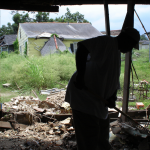I.L.A. Hall
2700 S. Claiborne AvenueNew Orleans LA 70113
The I.L.A. Hall — headquarters of the local chapter of the International Longshoreman’s Association — was a prime music venue in New Orleans’ Black community, featuring top-tier rhythm and blues shows as well as gospel concerts and other special events from its opening in 1959 until its demolition after Hurricane Katrina and the flood of 2005.
The building’s first floor housed the labor union offices and a pharmacy. The second floor was a spacious room with a drop ceiling that could accommodate around 1,000 people for concerts, proms, wedding receptions, reunions, and other gatherings. The audience sat on metal folding chairs at long tables on a linoleum floor, much like in a school cafeteria. There was a small raised bandstand and a snack bar on the side that sold beer and “set ups” at R&B shows.
In Freedom’s Dance: Social, Aid and Pleasure Clubs in New Orleans, the writer James B. Borders IV recalls his nights at I.L.A. Hall in the 60s:
Those dances gave guys like me the chance to slow drag occasionally with unfamiliar pretty young things…And when the Royal Dukes of Rhythm were headlining those Saturday night ILA gigs, they played lots of popular New Orleans R&B, always closing out the night with that great blues grinder “Driving Wheel” followed by the “Second Line,” which allowed our posse to buck-jump down the stairs, out the door, and into the thick night air with hope of being able to slip into some barroom later for a nightcap without being carded.
During the 1970s and 80s, Rufus Johnson — an independent music promoter and owner of Rufus Record Rack on Washington and LaSalle streets — regularly booked the I.L.A. for R&B, blues, and soul programs. He promoted shows by blanketing Black neighborhoods with colorful placards stapled to telephone polls. Johnson very much made the I.L.A. the New Orleans stop on the chitlin’ circuit during its era. Always ready to capitalize on the most recent hit record, Johnson booked the likes of Solomon Burke, O.V. Wright (Johnson loved Burke and Wright, featuring them often), Bobby “Blue” Bland, Little Milton, Little Johnny Taylor, Joe Tex, William Bell, Clarence Carter, Tyrone Davis, and Johnny Adams. (Johnson, a bail bondsman and later a candidate for local office, was indicted on fraud charges by a federal grand jury in 2014).
The I.L.A. also hosted many gospel programs usually promoted by Reverend/Bishop Herman Brown. His Easter Sunday program — which always featured Slim and the Supreme Angels — was especially popular for more than a decade. Name gospel programs in New Orleans (outside of Jazz Fest) ended after Brown died, but the Easter Sunday programs survived via local choirs and quartets. On the secular side, local bluesman and “human jukebox” Snooks Eaglin played Sunday nights.
By the new millennium, R&B revues became a rarity as promoters struggled to compete with casinos that could charge nominal, or sometimes no, admission. Writer Jeff Hannusch reported that on a rainy night in the fall of 2004, at an R&B show featuring Bobby “Blue” Bland, Jeff Floyd, and Latimore, the roof leaked, mold grew on the walls, and the ice machine was broken — but the music wasn’t affected one damn bit.
Images














